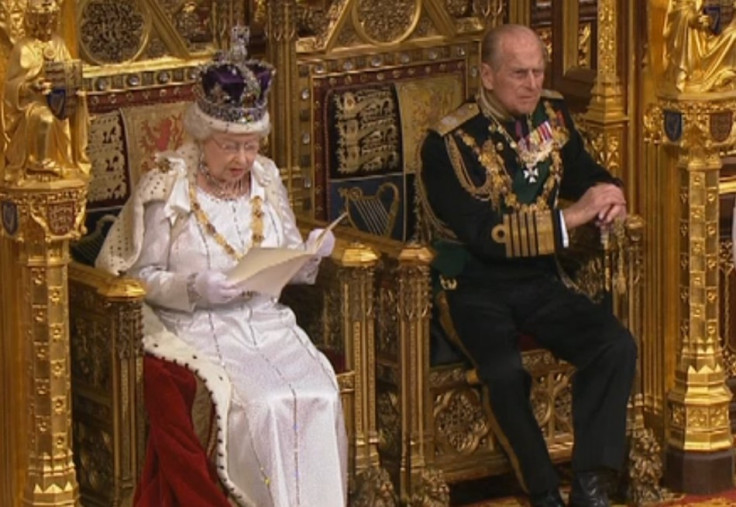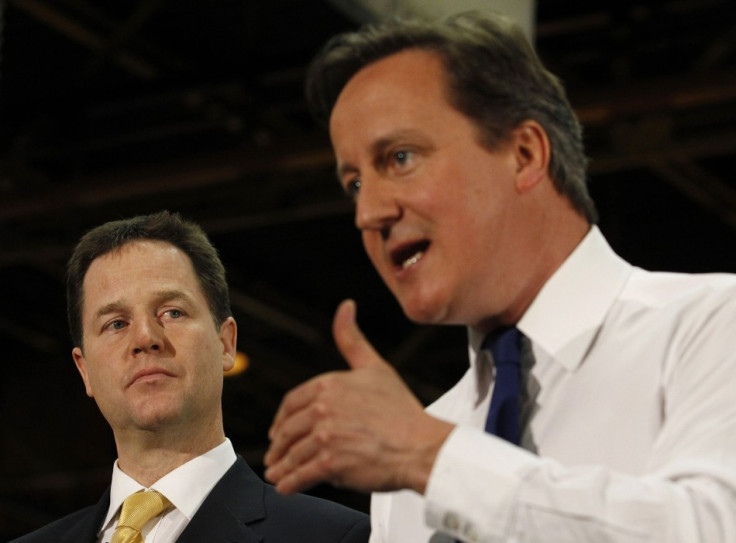Queen's Speech Key Points Focus on Deficit, Red Tape, Families and Lords Reform for David Cameron's Next 12 Months
Government will focus on economic growth, justice and constitutional reform in bid to get shaky coalition government back on track

The Queen's Speech has drawn up the coalition government's plans to focus on economic growth, justice and constiutional reform.
The address serves to lay out the government's legislative priorities in the coming 12 months, as the Queen lists the bills that will be put forward.
Prime Minister David Cameron will be keen for the chance to refresh the coalition's direction after a torrid few months of anti-NHS reform protests, Leveson Inquiry revelations and a mauling in the local elections.
IBTimes UK gives some of the key points of the Queen's Speech:
- The economy is the first priority.
The Queen opened her speech with: "My ministers' first priority will be to reduce the deficit and restore economic stability.
"Legislation will be introduced to reduce burdens on business by repealing unnecessary legislation and to limit state inspection of businesses."
These issues will fall within the wide-ranging enterprise and regulatory reform bill, which aims to continue to push the UK as a pro-business destination by cutting away swathes of red tape.
Other factors mentioned by the Queen include "legislation to reform competition law to promote exercise and fair markets".
However, previous discussions of the bill suggested that high executive pay would be tackled by increasing shareholder control, which is not mentioned directly.
The well-known banking reform bill, which proposes the splitting of banks into their retail and investment functions, is also mentioned.
The Queen said: "Measures will be brought forward to further strengthen regulation of the financial services sector and implement the recommendations of the Independent Commission on Banking."
- The government is looking to be family-friendly
The Queen said that the government would "strive to improve the lives of children and families" with a series of bills.
Extra provisions will be made for disabled children and those with special educational needs, while the family court system will also be subject to a series of efficiency measures. The Queen added that the role of the childrens commissioner, Dr Maggie Atkinson, would be strengthened.
Parents will be given more room to adjust their working timetables so that "both parents may share parenting responsibilities and balance work and family commitments".

- State and public pensions could be changing
The Queen's Speech revealed that plans for a new universal state pension rate, thought to be worth £155 a week, are under way.
She said: "My government will bring forward neasures to modernise the pension system and reform the state pension, creating a fair simple and sustainable foundation for provate saving."
She went on to say that legislation will be introduced to reform public service pensions "in line with the recommendations of the independent commission on public service pensions".
Neither proposed pension reform is expected to get an easy ride, with public sector unions sure to be outraged.
- The government wants to keep more secrets but read yours
Two very controversial subjects, secret courts and increased internet surveillance, were brought up in the speech.
She said: "My government will introduce legislation to strengthen oversight of the security and intelligence agencies. This will allow courts, through some limited closed proceedings, to hear a greater range of evidence on national security cases."
The prospect of "secret" court proceedings will be fiercely opposed by those in favour of public acces to the legal process amid claims that public oversight and transparency are a fundamental facet of the UK's legal system.
The Queen immediately followed one controversial subject with another, laying out the draft communications data bill. It aims to increase the government's ability to monitor internet communications.
She said: "My government intends to bring forward measures to maintain the ability of the law enforcement and intelligence agencies to access vital communications data under strict safeguards to protect the public, subject to scrutiny or draft clauses."
Both pieces of legislation are expected to face prolonged resistance, no matter how strict the safeguards.
Another key legal issue that will be tackled is that of freedom of speech and reforms to the law of defamation.
- The Liberal Democrats may get their House of Lords Reforms
Deputy prime minister Nick Clegg was happy to hear the Queen say: "A bill will be brought forward to reform the composition of the House of Lords."
The reforms, keenly supported by the Lib Dems, were feared dropped in the face of a Conservative backlash but featured prominently in the speech, as well as in the opening line.
The proposed reforms would see the house numbers slashed from 800 to around 300, while a shift would be made towards a mainly elected upper house, with Lords being granted 15-year terms.
Clegg and supporters claim that reforms would increase public interest in the upper house, which many view as outdated and cumbersome.
- There will be plenty to talk about
Other legislation brought foward in the speech included a move towards individual voter registration, froems to the water and electricity industries, a new watchdog to oversee supermarkets, the creation of a National Crime Agency and specific drug driving offences and plans to spend 07 percent of gross national income on official development assistance from 2013.
Meanwhile Labour MP Dennis Skinner got the coalition riled before the speech with his, now traditional, comment to Black Rod.
"Jubilee Year. Double-dip recession. What a start," he said.
© Copyright IBTimes 2024. All rights reserved.





